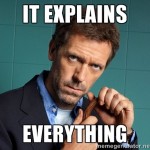Jason Mankey recently weighed in on the “atheist Pagan” controversy at his new blog “Raise the Horns”. By the way, I saw Jason at Pantheacon and he was easily one of the most interesting and entertaining speakers at the event. But I don’t want to talk about Jason’s post other than to say it is a good example of a response from a polytheistic perspective. And I don’t want to beat a dead ashvamedha either. But one one of the comments by Brian Rush to Jason’s post was really interesting and introduced a whole new dimension to the discussion. In his post, Jason had written: “I’ve drawn down deity on a number of occasions, and I think that the experience was far more than a trick of the mind.” It was to this comment that Brian responded:
This is a classic sole-alternative fallacy. The author here is presenting only two possibilities: that the deity being drawn down literally “exists” in some simplistic fashion, or a dismissive “it was all a trick of the mind.” There are more possibilities than those two.
This kind of thing is on my mind lately because I’m spending some time in company with devout Christians on a genuine spiritual quest in that framework. This is really helping me to separate intellectual ideas about what we do, from what we do and the Reality we do it with. I’ve had to dredge up all that old Christian language I used to employ years ago so as to communicate with these people, and to see through the morass of their intellectual beliefs ABOUT deity (with which I often don’t agree), and the truth presenting itself in their hearts and in their lives (which is quite clearly real).
I don’t believe in their God as they conceive Him. I don’t believe in the infallibility of their scriptures, as they do. I don’t believe in the special divinity of their founding prophet (although I do recognize his deep spirituality and wisdom). I don’t believe that the Cosmos thirsts for retaliatory blood, and so I don’t believe that It was appeased by Its son being tortured and put to death in a gruesome fashion. And I reject most of Christian sexual morality into the bargain.
Yet these (as I see them) totally wrong-headed and cockeyed intellectual beliefs don’t stop these Christian folks from experiencing genuine and powerful spiritual dimensions in their life, of a type that I can recognize very well.
Now what should that tell us? That the same applies to OUR ideas about the Reality underlying such experience. The response of the gods to an invocation is not something to be dismissed as “a trick of the mind.” It is very real, powerful, positive, and life-transforming. But at the same time, it’s a great mistake to suppose that we know, intellectually, what it is, and to put it into a simplistic this-not-that framework in the mind.
The Reality that gives rise to spiritual experience is what It is. Our ideas about it, whether monotheistic, polytheistic, or something else, are not that Reality. They are just our ideas about it. And our ideas about it can be (and probably are) wrong, without the Reality itself being made unreal just by that, anymore than the sun ceased to shine when our ancestors figured out that it wasn’t really a chariot being driven across the sky by Apollo.
(I should note that Jason responded to Brian by acknowledging that there is a range of possibilities between literalism and delusion.)
As I read this, I wondered how many of the polytheists who recently became irate at the questioning of their beliefs would afford Christians the same courtesy that they are asking for. If a polytheist claims that questioning the reality of the literal existence of a being known as Thor is out of bounds, I would ask if their commitment to tolerance is deep enough to include acknowledging the literal existence of Yahweh. Given the amount of anti-Christian animus I have seen coming from the Pagan community, I think I already know the answer.
There are a couple of things I take away from this:
1. This is for the atheists, non-theists, naturalists, pantheists, humanists, and anyone else who feels that the beliefs of others are a legitimate subject of critical inquiry: I think any critical discussion of this topic should begin with the genuineness of the experience of the people in question, whether they be polytheists, Christians, or whoever. The easy way out for naturalistist or atheists is to dismiss the experiences of others as self-deception. Such explanations are facile. We should be suspicious of any explanation that elevates us to an intellectual pedestal while dismissing the experience of the majority of human beings who have lived on the planet. (According to the Pew Forum, 80% of people say the believe they have received a response to a specific prayer request. And I suspect it would be higher if spiritual experience were defined more broadly.)
2. This is for polytheists, literalists, and anyone else who is sensitive to other people critically examining their beliefs: We need to distinguish between our experience and our interpretation of our experience. This is the real insight of Brian’s comment above. This is something I have had to deal with as I left my religion of origin. I had the most powerful spiritual experiences of my life in the context of the Mormon faith. While I admit that, in some instances, I was guilty of self-deception, I had other experiences whose genuineness I do not doubt even now. What I do question is my interpretation of those experiences. When a polytheist hears an atheist or pantheist questioning their beliefs, they should ask whether it is their experience or their interpretation of their experiences that is being questioned. And even though it makes us uncomfortable, our interpretations are a valid subject for critical discussion.















